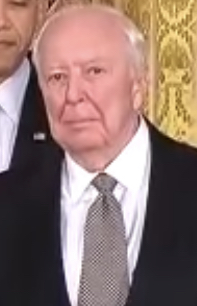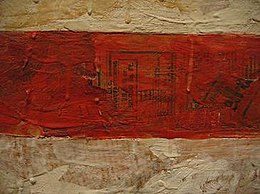Jasper Johns | |
|---|---|
 Johns receiving the Presidential Medal of Freedom in 2011 | |
| Born | Jasper Johns Jr. May 15, 1930 Augusta, Georgia, U.S. |
| Known for | |
| Notable work |
|
| Movement | Abstract expressionism, Neo-Dada, pop art |
| Awards |
|

Jasper Johns (born May 15, 1930) is an American painter, sculptor, draftsman, and printmaker. Considered a central figure in the development of American postwar art, he has been variously associated with abstract expressionism, Neo-Dada, and pop art movements.[1][2]
Johns was born in Augusta, Georgia, and raised in South Carolina. He graduated as valedictorian from Edmunds High School in 1947 and briefly studied art at the University of South Carolina before moving to New York City and enrolling at Parsons School of Design. His education was interrupted by military service during the Korean War. After returning to New York in 1953, he worked at Marboro Books and began associations with key figures in the art world, including Robert Rauschenberg, with whom he had a romantic relationship until 1961.[3][4] The two were also close collaborators, and Rauschenberg became a profound artistic influence.[5]
Johns's art career took a decisive turn in 1954 when he destroyed his existing artwork and began creating paintings of flags, maps, targets, letters, and numbers for which he became most recognized. These works, characterized by their incorporation of familiar symbols, marked a departure from the individualism of Abstract Expressionist style and posed questions about the nature of representation. His use of familiar imagery, such as the American flag, played on the ambiguity of symbols, and this thematic exploration continued throughout his career in various mediums, including sculpture and printmaking.
Among other honors, Johns received the Golden Lion at the Venice Biennale in 1988, the National Medal of Arts in 1990, and the Presidential Medal of Freedom in 2011.[6] He was elected to the American Academy of Arts and Letters in 1973 and the American Philosophical Society in 2007.[7] He has supported the Merce Cunningham Dance Company and contributed significantly to the National Gallery of Art's print collection. Johns is also a co-founder of the Foundation for Contemporary Arts. He currently lives and works in Connecticut. In 2010, his 1958 painting Flag was sold for a reported $110 million in a private transaction, becoming the most expensive artwork sold by a living artist.[8][9]
- ^ Solomon, Deborah (February 7, 2018). "Jasper Johns Still Doesn't Want to Explain His Art". The New York Times. ISSN 0362-4331. Retrieved April 21, 2021.
- ^ Stein, Judith (October 24, 2021). "Jasper Johns, master virtuoso of the double, one of the most influential of American painters, in massive Philly-NYC exhibition". The Philadelphia Inquirer. Retrieved November 26, 2023.
- ^ Cite error: The named reference
Horne1996was invoked but never defined (see the help page). - ^ Small, Zachary (May 19, 2017). "Why Can't the Art World Embrace Robert Rauschenberg's Queer Community?". Artsy. Retrieved November 26, 2023.
After he and Weil divorced in 1953, Rauschenberg had a brief fling with Twombly, which subsequently led to a romance with his collaborator, Jasper Johns, from 1954 to 1961.
- ^ Stern, Mark Joseph (February 26, 2013). "Is MoMA Putting Artists Back in the Closet?". Slate. ISSN 1091-2339. Retrieved November 26, 2023.
Rauschenberg and Jasper Johns were lovers during this six-year period of collaboration, and their relationship had a profound impact on their art.
- ^ "Lifetime Honors: National Medal of Arts". National Endowment for the Arts. n.d. Archived from the original on January 20, 2010. Retrieved October 14, 2021.
- ^ "APS Member History". search.amphilsoc.org. Retrieved May 17, 2021.
- ^ Vogel, Carol (March 18, 2010). "Planting a Johns 'Flag' in a Private Collection". The New York Times. ISSN 0362-4331. Retrieved November 26, 2023.
- ^ Töniges, Sven (May 14, 2020). "The Flag painter: Jasper Johns turns 90". DW. Retrieved November 26, 2023.